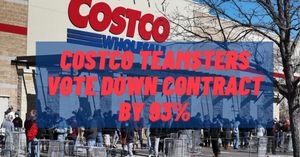Elon Musk's social media platform X has escalated its legal battle by broadening its lawsuit against several major advertisers, claiming they engaged in an unlawful advertising boycott. This amended complaint, filed recently in Texas, sees the inclusion of prominent brands such as Nestlé, Lego, Abbott Laboratories, Colgate-Palmolive, Pinterest, Tyson Foods, and Shell.
This lawsuit, which initially targeted the World Federation of Advertisers (WFA) and entities like CVS Health and Twitch, alleges collusion among these companies following Musk's controversial takeover of the platform. Since Musk acquired the platform, which was then known as Twitter, concerns among advertisers about brand safety led to significant changes and withdrawals from ad commitments.
X's lawsuit, which commenced back in August 2024, claims these brands, under the auspices of the now-defunct Global Alliance for Responsible Media (GARM), conspired to withhold billions of dollars’ worth of advertising revenue.
According to the complaint, this coordinated strategy led to at least 18 member companies of GARM halting advertising on the platform during the latter part of 2022. The aim, X argues, was to force the social media giant to comply with GARM’s standards, which many believe were harsh and selectively enforced.
"What we have here is collective action among competitors which undermines the competitive process,” the legal representation for X stated, underlining their position against the alleged monopoly behavior exhibited by the brands named.
Historically, GARM's mission was to create standardized industry frameworks for advertising safety, addressing issues such as hate speech and misinformation. Despite its noble aims, X claims GARM’s actions were detrimental to its business, adversely affecting user engagement and advertisement effectiveness.
The lawsuit asserts advertising revenue dropped significantly after Musk’s acquisition, with many big-name advertisers fleeing the platform due to shifting policies and reduced content moderation. Advertisers began voicing concerns over Musk's approach to managing content on X soon after he took the reins, which included reinstatement of previously banned accounts.
Musk himself had previously commented on the issue, urging those argued to be boycotting to take legal action: “Everyone who has been boycotted should file a lawsuit,” he tweeted. His approach to both reinstatement and his overall messaging has been polarizing, contributing to significant visitor and ad revenue changes.
Adding substantial brands like Nestlé and Lego to the existing lawsuit reflects the depth of X’s frustration with what it perceives as wrongful collaborative business practices those companies engaged in—aimed at enforcing prospective brand safety standards out of sync with the platform’s operations.
The WFA has publicly contested the allegations, asserting compliance with fair competition laws. After altering its strategy and scaling down operations, the organization stated, “Recent allegations misconstrue its purpose and activities, draining our resources.” This adds yet another layer to the ever-evolving legal drama surrounding marketing conglomerates and social media advertising.
Surprisingly, as the litigation expands, reports indicate some companies have begun to return to advertise on X. For example, Amazon has increased its ad placements, perhaps signaling the advertising industry’s complex, shifting approach under Musk’s leadership.
Despite the chaos, X maintains its legal claim, arguing advertisers shouldn’t dictate their platform’s safety standards. “Social media platforms ought to set their own brand safety standards appropriate for their unique user base,” X’s complaint emphasizes, rebutting traditional advertising norms put forth by GARM.
While Musk’s tactics have resulted in heavy criticism, they have undeniably catalyzed changes within the digital ad space. The lawsuit extends beyond X, highlighting broader industry tensions particularly relating to how power dynamics play out within social platforms and the advertisers dependent on them.
With Musk tussling against some of the world’s biggest brands, and with broader repercussions reverberation through social media and advertising industries, X's lawsuit is worth watching. Just where the outcome will land remains uncertain, and both sides brace themselves for what could set precedent within digital marketing law.



